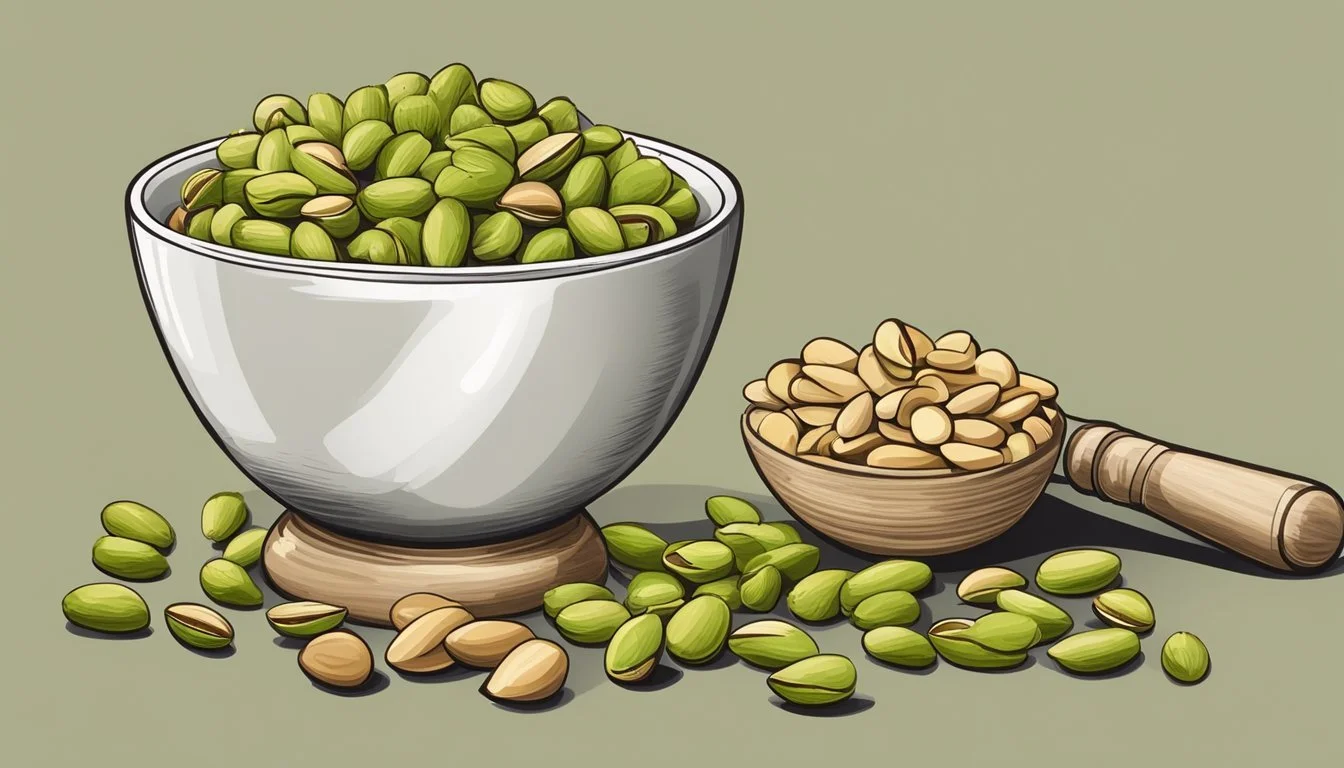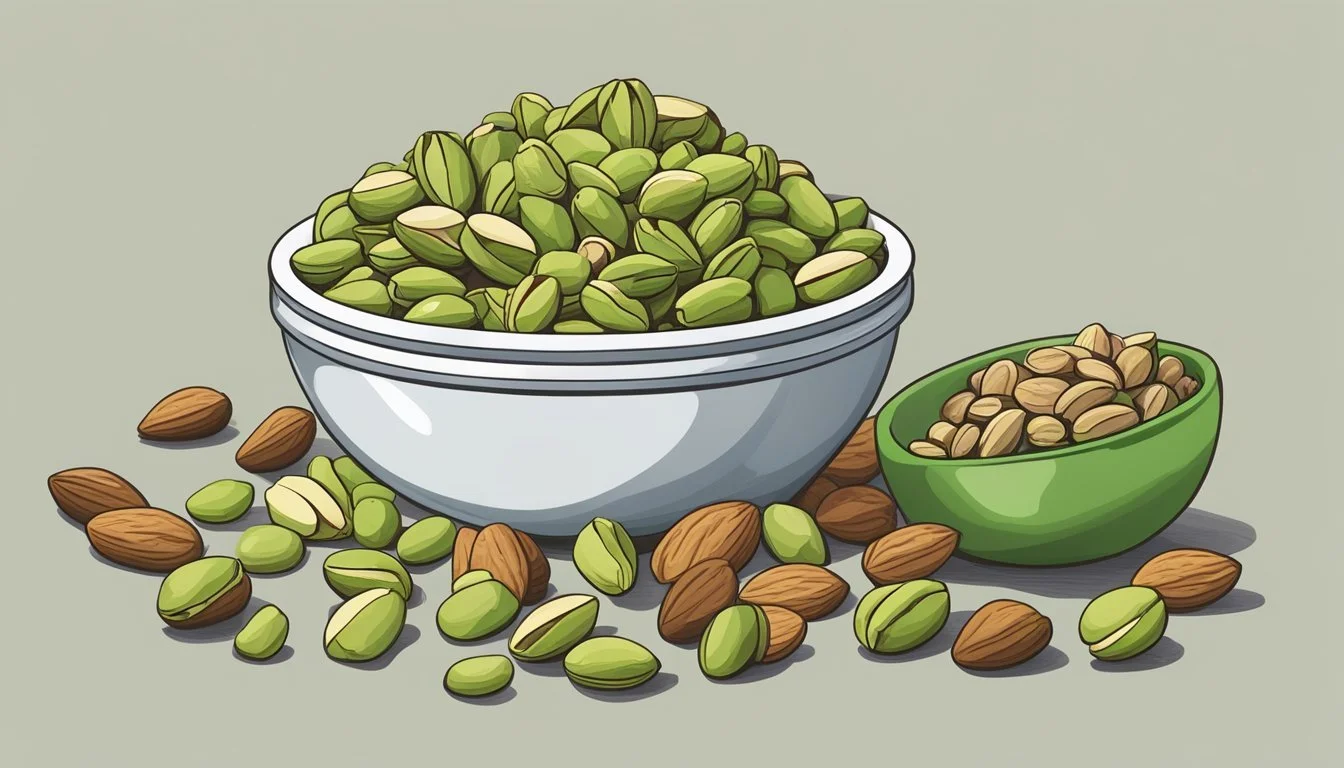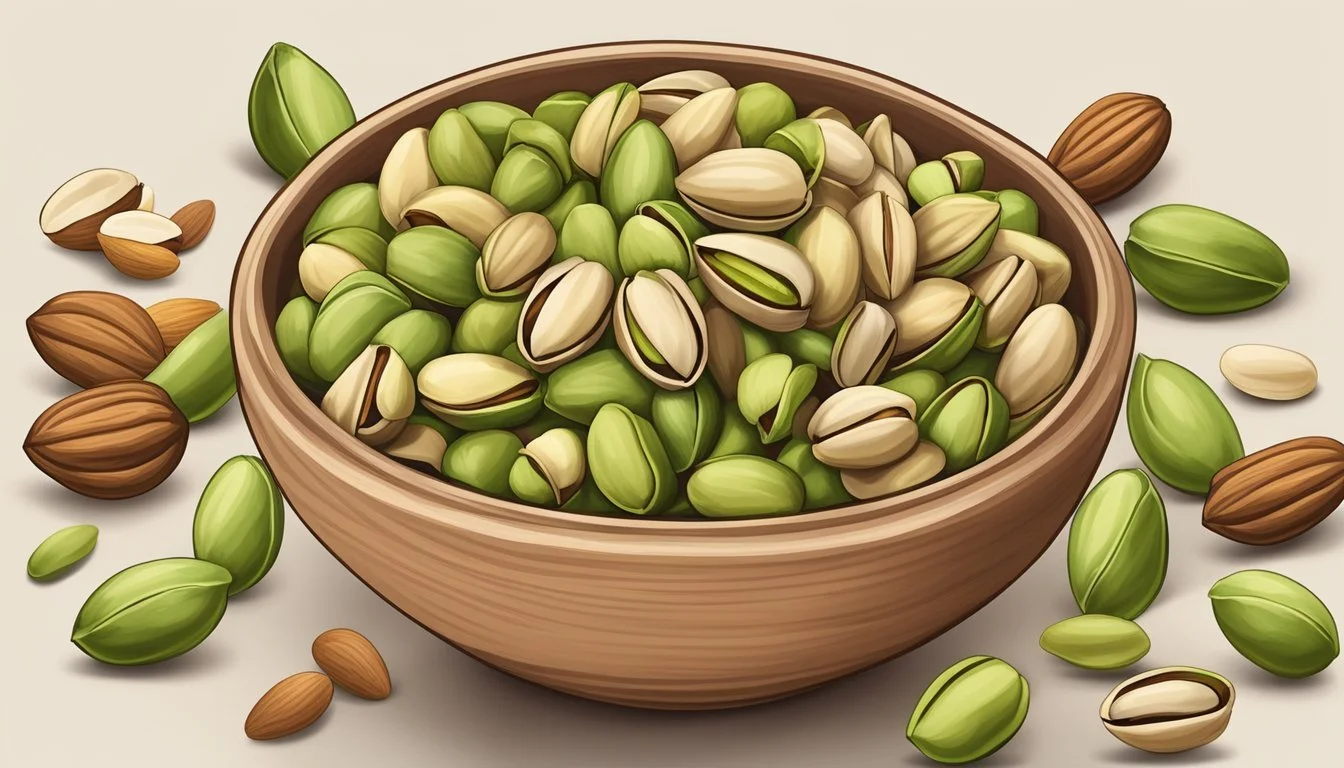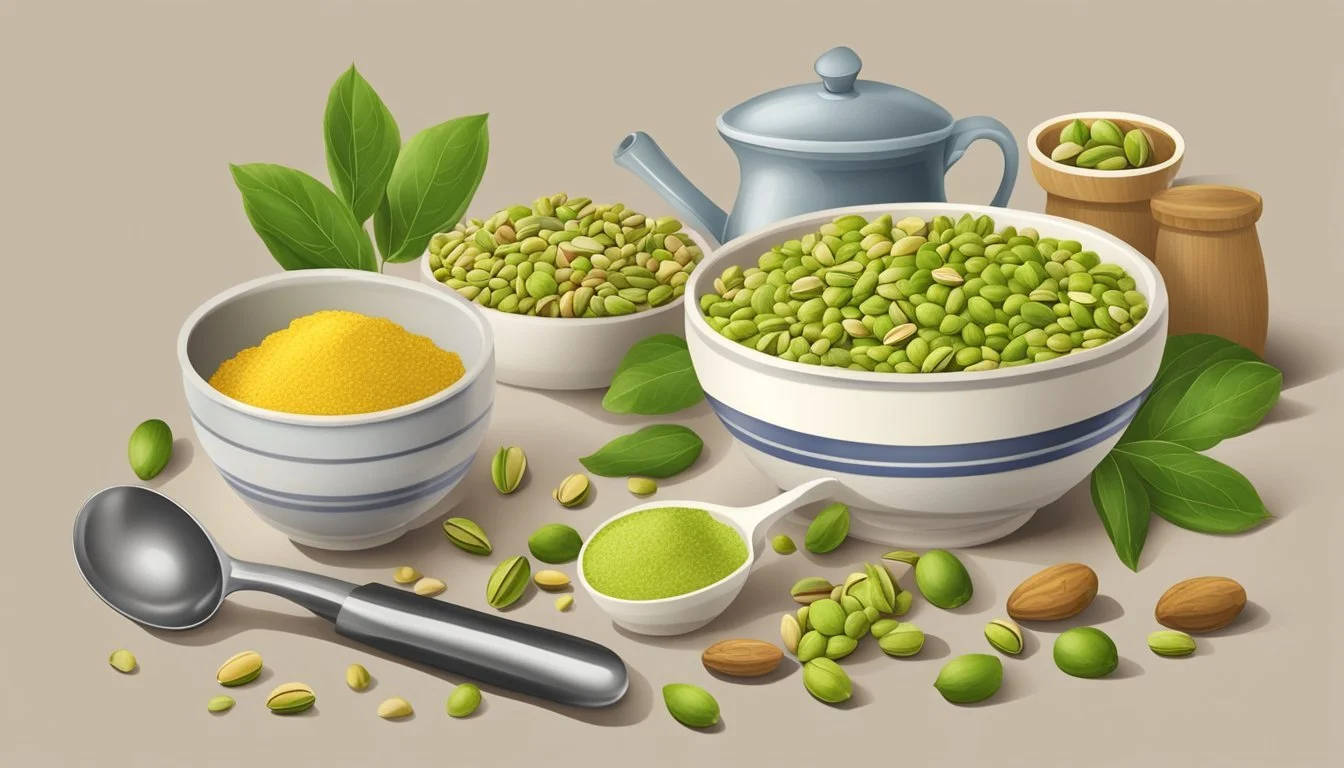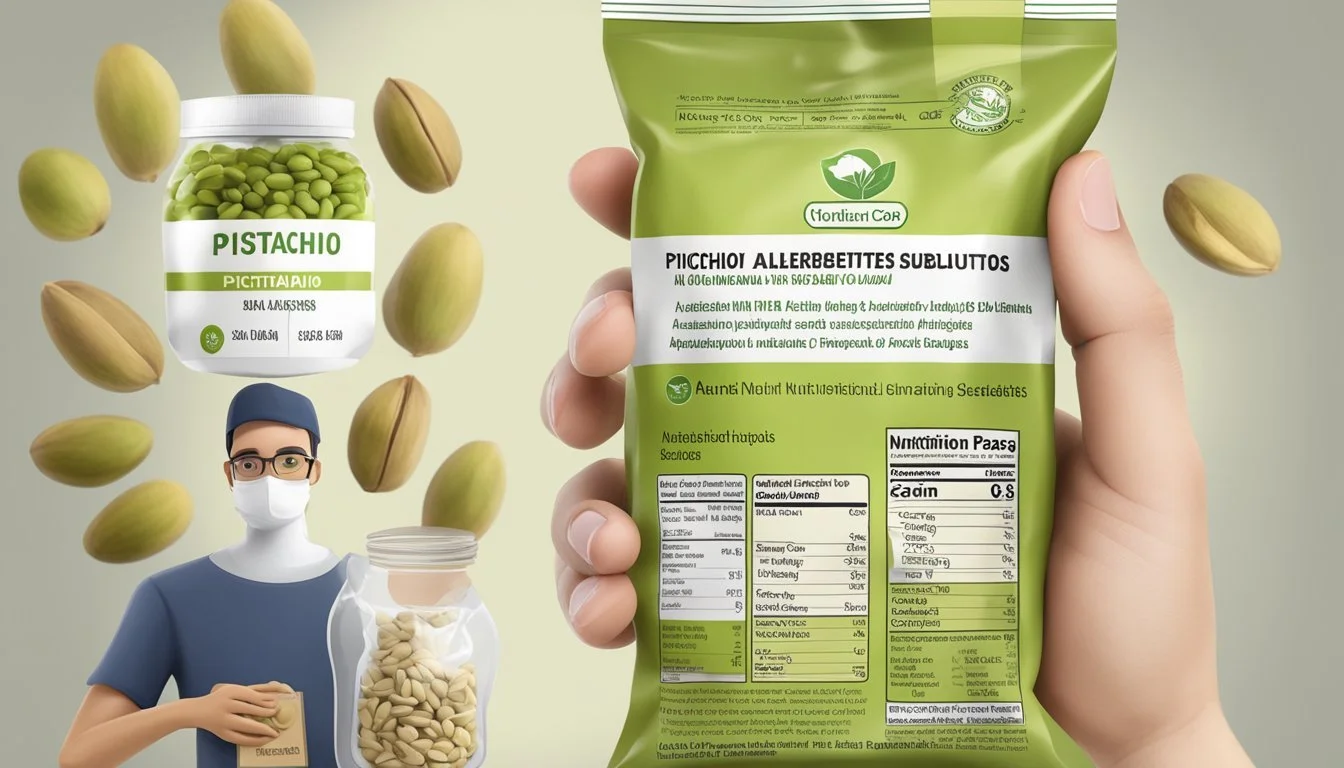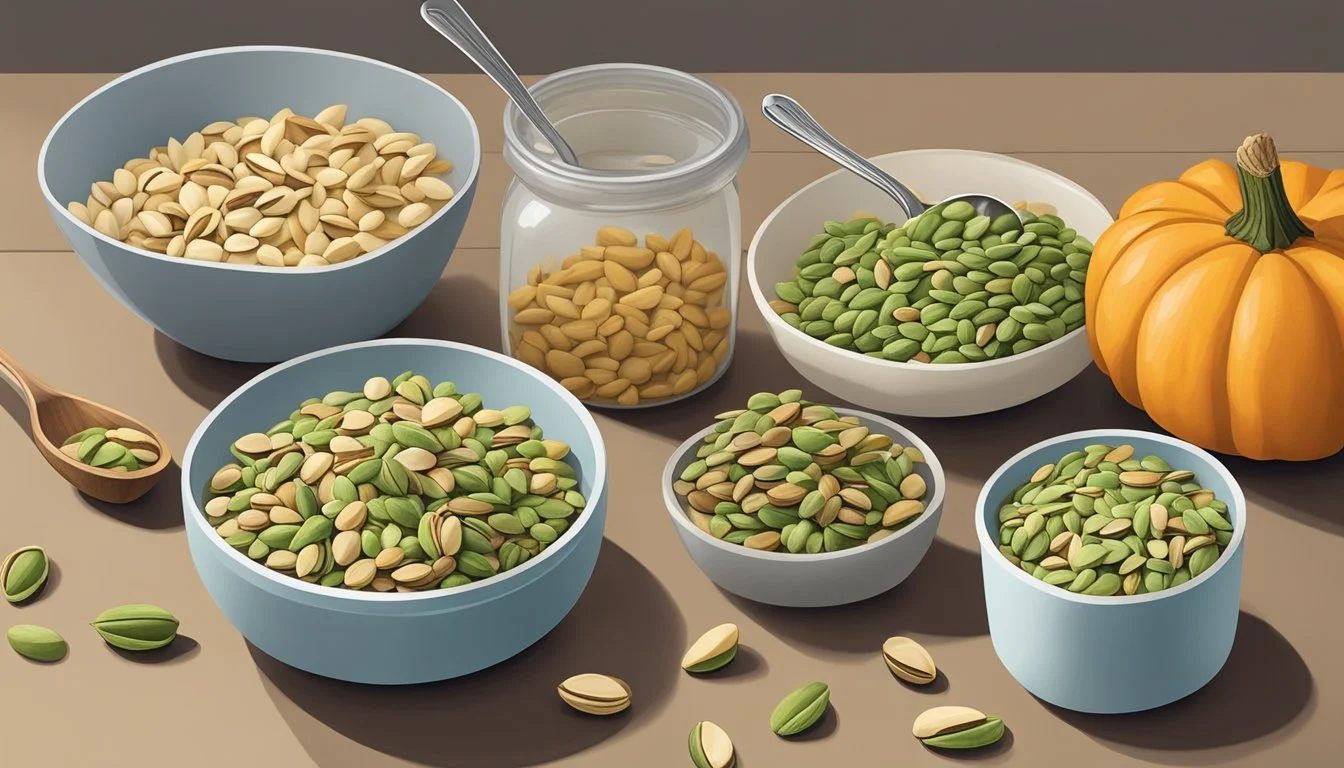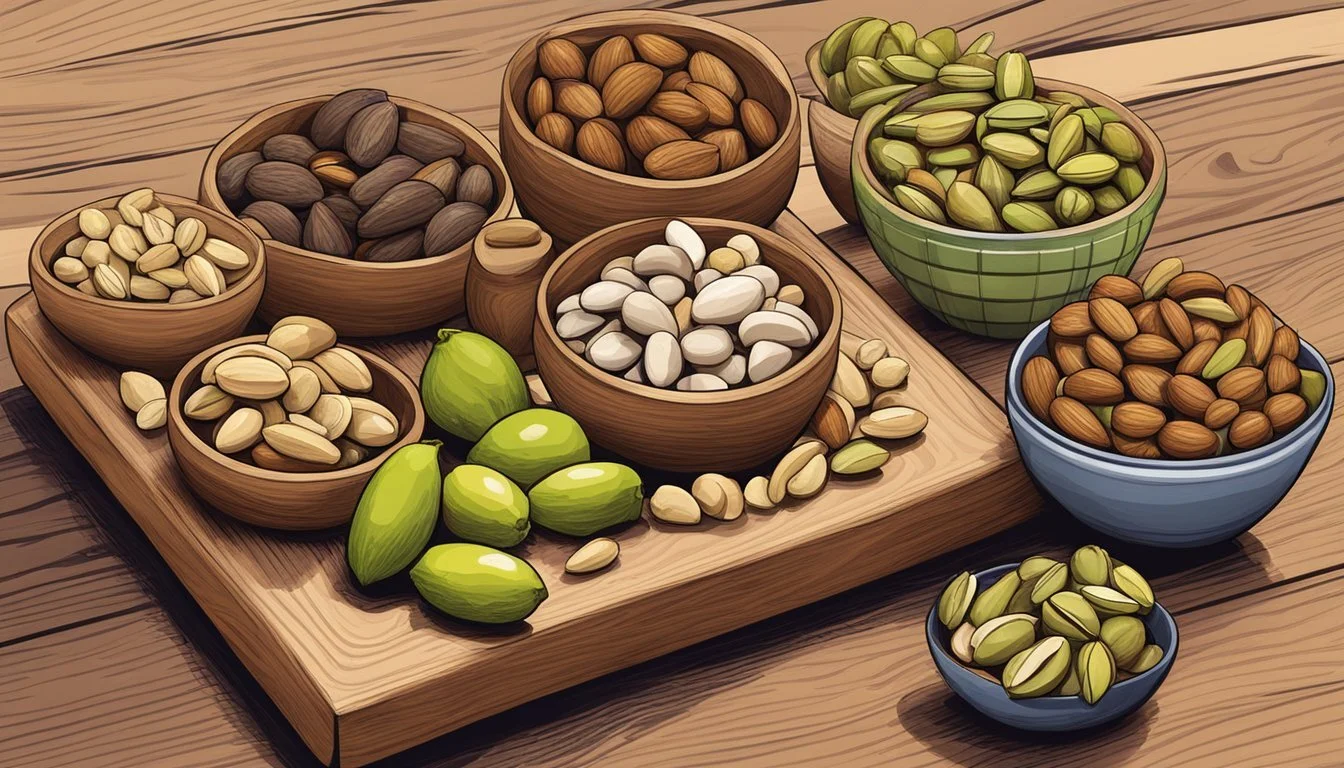Pistachio Substitutes
Top Alternatives for Your Recipes
Pistachios, with their rich and unique flavor, are a favorite ingredient in many culinary dishes, spanning from sweet to savory. Renowned for their vibrant green hue, and subtly sweet, somewhat earthy taste, pistachios enhance a plethora of recipes, including baked goods, salads, and even crusted proteins. However, their cost and availability can sometimes be limiting factors, prompting the need for suitable alternatives that can mimic their distinct characteristics.
In the search for pistachio substitutes, several nuts and seeds come to the forefront due to similar textural properties and complementary flavors. Almonds, particularly when blanched to achieve a closer visual semblance to pistachios, offer a comparable taste profile, making them an excellent stand-in. This is especially true in baking, where almond meal or almond flour can be utilized as a gluten-free replacement for pistachio flour. Cashews and Brazil nuts are also credible substitutes, known for their creamy texture and a flavor profile that, while slightly different, still resonates well in recipes typically calling for pistachios.
The substitution does not end with nuts; seeds like pumpkin and sunflower provide nut-free alternatives, bringing a different but equally satisfying crunch and taste to dishes. These seeds can be used in various recipes, from baked goods to snack mixes, presenting a versatile option for those with nut allergies or simply looking for a twist on traditional ingredients. Through careful selection of these substitutes, the essence of pistachios can still be captured, allowing dishes to retain their intended charm and allure.
Understanding Pistachios
Pistachios are a nutritious nut known for their unique flavor and various culinary applications. They are notable for their protein content and healthy fats, as well as being an excellent source of antioxidants.
Nutritional Profile
Pistachios offer a rich blend of nutrients that contribute to their popularity as a healthy snack. In terms of their nutritional content, a one-ounce serving (about 49 kernels) of pistachios contains approximately:
Calories: 159
Protein: 5.72 grams
Fat: 12.85 grams (90% of which are healthy fats)
Carbohydrates: 7.7 grams
Fiber: 3 grams
In addition to these macronutrients, pistachios are a good source of vitamins and minerals, including Vitamin B6, which is important for immune function and brain health. They also contain a variety of antioxidants, such as lutein and zeaxanthin, which are pivotal for eye health.
Culinary Uses
Pistachios are versatile in the kitchen, serving multiple culinary purposes. They can be enjoyed raw or roasted as a snack. Due to their distinct green color and savory taste, pistachios are often used as a flavorful ingredient in sweet and savory dishes alike. Some specific uses include:
Garnishing for salads and desserts
Confections such as baklava and pistachio ice cream
Baking, where ground pistachio often substitutes flour for a unique twist
They provide textural contrast and a visual appeal to a variety of recipes due to their vibrant color. Additionally, they are commonly found in spreads like pistachio butter or pesto for an added depth of flavor.
Reasons for Substituting Pistachios
In various scenarios, individuals seek alternatives to pistachios due to health concerns, dietary choices, or economic factors. Substitutes can offer similar nutritional benefits and culinary experiences.
Allergy Considerations
Individuals with a nut allergy may experience allergic reactions to pistachios. Since pistachios are a tree nut, those who are allergic must avoid them to prevent symptoms ranging from mild to life-threatening. Alternative options are essential to ensure their safety.
Dietary Restrictions
Certain dietary restrictions, whether for health reasons or personal choices, may prohibit the consumption of pistachios. People may be following a specific diet that limits the intake of certain nuts or components found in pistachios. They must find substitutes that align with their dietary constraints.
Cost and Availability
Pistachios can be expensive and not always readily available. Their cost is influenced by various factors, including seasonality and harvesting conditions. For those who find pistachios economically or geographically inaccessible, finding a more affordable and available substitute is crucial.
Selecting Pistachio Substitutes
When choosing a substitute for pistachios, one should consider both the flavor profile and texture desired in the dish to maintain its character.
Flavor Match
Substitutes should complement the dish with a nutty flavor that resembles pistachios. Almonds offer a close match, with their inherent nutty and slightly sweet flavor, making them an excellent choice. For an even better visual match, blanched almonds are suggested due to their light color. Cashews are another option with a comparable buttery flavor. Additionally, Brazil nuts can be considered for their rich, nutty taste, albeit being somewhat sweeter.
Texture Considerations
The texture of the nut is paramount, particularly when looking for that distinctive crunchy texture pistachios provide. Almonds again are suitable for their firm texture. Cashews, while less crunchy, can still fulfill the textural role when a softer crunch is permissible. It's important to use a 1:1 ratio when substituting whole or chopped nuts to maintain the intended texture in recipes.
Common Pistachio Substitutes
When a recipe calls for pistachios and they are either unavailable or unsuitable for a consumer's dietary needs, various substitutes offer similar textures and flavors. Below are categorized alternatives that may serve as pistachio substitutes in cooking and baking.
Nuts and Seeds
Almonds:
Whole or Chopped: Use in a 1:1 ratio for pistachios in recipes.
Blanched: Best to resemble the color of pistachios in baked goods.
Cashews:
Offer a rich, sweet flavor; effective as a substitute in creamy dishes and desserts.
Hazelnuts:
Provide a distinctly nutty taste; suitable for baked recipes.
Pine Nuts:
Deliver a sweet and subtle flavor, though they tend to be pricier.
Walnuts:
A robust substitute, walnuts are easily accessible and can be used in similar quantities to pistachios.
Macadamia Nuts:
Known for their buttery flavor; a luxurious alternative, often used in confectioneries.
Pecans:
May contribute a sweeter profile; best used in desserts.
Brazil Nuts:
Their creaminess makes them a good stand-in, especially in snacks and as toppings.
Nut-Free Alternatives
Sunflower Seeds:
An allergen-friendly option with a mild taste and a pleasant crunch.
Pumpkin Seeds:
Another nut-free choice, pumpkin seeds, or pepitas, offer a chewy texture and can be salted or roasted for additional flavor.
Sesame Seeds:
With a unique taste, sesame seeds work well in baked goods and Asian-inspired dishes.
The use of these substitutes can vary based on the recipe and the desired outcome. It is important to consider not just the flavor, but also the texture and appearance that pistachios bring to a dish, and choose a substitute that best matches these qualities.
Pistachio Substitute Applications
When cooking or baking, various nuts can be substituted for pistachios to achieve a similar taste and texture profile. These substitutes are handy across a range of dishes from sweets to salads.
In Baked Goods
In recipes that call for pistachios, almonds and cashews are excellent alternatives due to their nutty flavor and crunch. They are particularly effective in baked goods such as cookies and pastries. For a gluten-free option, almond flour can replace pistachio flour. When using almonds, one might opt for blanched almonds to achieve a color that closely resembles pistachios.
Recommended Substitution Ratios for Baked Goods:
Substitute Nut Ratio Almonds (Whole, Chopped) 1:1 Almond Flour/Meal As per recipe requirements
In Salads and Dressings
One can use cashews or almonds to garnish salads or incorporate in dressings as stand-ins for pistachios. They add a delightful crunch and a complementary flavor to both savory and sweet salad compositions.
Salad and Dressing Tips:
Tips Description Texture Crush or chop the nuts to resemble the texture of chopped pistachios. Flavor Roast the nuts briefly to enhance their nutty flavor in the salad.
For Snacks and Trail Mixes
Trail mixes and snacks benefit from a variety of nuts, including cashews, almonds, and hazelnuts. These substitutes can be used in equal measure to pistachios, and they provide the same rich source of energy and nutrients. They can also be added to granola and oatmeal to mirror the hearty, filling nature of pistachios in these applications.
Snack Preparation:
Substitute Nut Preparation Method Hazelnuts Roast and skin before adding to mixes Cashews Use raw or lightly salted for a more authentic flavor
Nut Substitutes by Dish Type
When replacing pistachios in various dishes, it's important to consider the unique flavors and textures that different substitutes can bring to each type of meal.
Desserts
In desserts, almonds can be a prime substitute for pistachios due to their similar texture and the way they complement sweet profiles. For example, almond meal can replace pistachio flour in gluten-free baking. In dishes like baklava, a treat hailing from Central Asia and popular in countries like Afghanistan, one could use chopped almonds or cashews for a similar crunch and rich flavor.
Baking: Almond flour/meal for pistachio flour
Baklava: Chopped almonds or cashews
Main Courses
For main courses that require the use of nuts, such as certain seafood dishes or stir-fries, cashews are an excellent alternative because their creamy texture and sweet taste mirror those of pistachios. They can be used in sauces or as a garnish, and their softness after cooking is particularly appealing.
Seafood Dishes: Cashews in sauces/garnishes
Stir-fries: Roasted cashews for additional crunch
Breakfasts
In breakfast recipes, utilizing a variety of seeds, like pumpkin or sunflower seeds, can serve as a nutrient-rich and flavorful replacement for pistachios. They work well in nut muffins and can be roasted to enhance their flavor. These seeds offer a different nutritional profile, including magnesium and vitamin E.
Nut Muffins: Pumpkin or sunflower seeds (roasted for more flavor)
Porridge/Oatmeal: Seeds or almond slices for topping
Health Considerations When Substituting
When choosing substitutes for pistachios, individuals should consider the nutritional profile, focusing particularly on fats, oils, proteins, and fiber, to ensure alignment with their health goals and dietary needs.
Fats and Oils
Pistachios are rich in healthy fats, which are beneficial for a heart-healthy diet. Substitutes such as almonds and cashews also contain healthy fats, but their fatty acid composition varies. Almonds, for example, can offer a similar monounsaturated fat content, making them an appropriate alternative, especially for those following a low-carb or keto diet. It is essential to consider the type of fats when substituting:
Monounsaturated Fats: Promote heart health
Polyunsaturated Fats: Include essential omega-3 and omega-6 fatty acids
Nut Type Monounsaturated Fats Polyunsaturated Fats Pistachios High Moderate Almonds High Moderate Cashews Moderate Low Brazil nuts Moderate High
Protein and Fiber
Pistachios offer not only a satisfying crunch but also a valuable source of protein and dietary fiber, which contribute to satiety and digestive health. Almonds share a similar protein content, providing an excellent substitution for those on plant-based diets or with dietary restrictions. When comparing other potential substitutes, it's essential to note their fiber content, particularly for those managing carbohydrate intake for conditions such as diabetes. Here's how some nuts compare:
Protein: Needed for muscle repair and growth
Fiber: Aids in digestive health and can help manage blood sugar levels
Nut Type Protein (per ounce) Fiber (per ounce) Pistachios Approx. 6g Approx. 3g Almonds Approx. 6g Approx. 4g Cashews Approx. 5g Approx. 1g Brazil nuts Approx. 4g Approx. 2g
Substitutes should be carefully selected to match one's nutritional targets, especially if adhering to specific dietary frameworks or managing health conditions.
Practical Tips for Substituting
When replacing pistachios in recipes, it’s important to consider both the quantity and the flavor profile of the substitute to ensure a suitable match.
Measuring and Ratios
For every 1 ounce of pistachios in shell, one can readily substitute an equivalent quantity, which is around 20 kernels of a chosen nut substitute. If substituting shelled pistachios with another nut, a 1:1 ratio by volume is a reliable guideline. When dealing with shelled pistachios, keep in mind that 1 pound in shell yields about 2 cups shelled, which can then be equated to the same volume of substitute nuts. When precision is key, especially in baking, adhere to these conversions:
1 cup in shell = 1/2 cup kernels
1 pound in shell = 2 cups shelled (kernels)
Taste Adjustments
Finding a nut with a similar texture and flavor is crucial for a seamless substitution. Almonds, for example, can be used in their blanched form to mimic the mild and slightly sweet flavor of pistachios, as well as their creamy texture. They can be roasted to enhance their nuttiness. When replacing pistachios with a salted variety of another nut, one may need to adjust the recipe to account for the extra salt. For a rich flavor profile, Brazil nuts can substitute pistachios, particularly in snacks or recipes where their size and richness are complementary.
When substituting for pistachios, whether in sweet or savory dishes, always consider using the nuts in moderation to maintain the intended flavor balance of the dish.
Nut Substitutes in Special Diets
When choosing substitutes for pistachios in specialized diets, it’s important to consider both nutritional content and dietary restrictions. The alternatives below cater to vegan and vegetarian diets, low-carb and keto lifestyles, and those with nut allergies.
Vegan and Vegetarian
For individuals following vegan or vegetarian diets, seeds are excellent replacements for nuts. They offer a similar texture and nutritional profile. Roasted pumpkin and sunflower seeds are common choices, and tahini—a paste made from sesame seeds—can be used in dressings and sauces for added creaminess and flavor.
Seeds to consider:
Pumpkin seeds
Sunflower seeds
Sesame seeds (Tahini)
Low-Carb and Keto
Adherents of low-carb and keto diets seek substitutes that are not only nut-free but also low in carbohydrates. Almond flour works well as a flour replacement for baking, keeping recipes aligned with keto guidelines. Seeds can be used for their protein and fat content without adding excess carbs.
Keto-friendly substitutes:
Almond flour or meal
Roasted seeds (minimal carb content)
Nut Allergies
For those with nut allergies, avoiding cross-contamination is key. People can opt for sunflower seed butter or butters made from seeds, which are less likely to trigger allergic responses. Always choose products labeled as nut-free to ensure safety.
Nut-free butter substitutes:
Sunflower seed butter (
SunButter)Tahini (Sesame seed paste)

